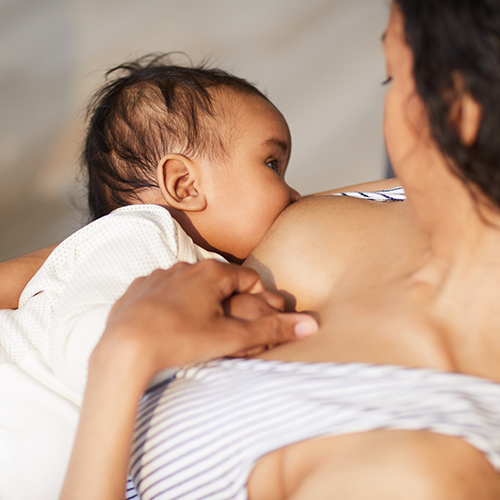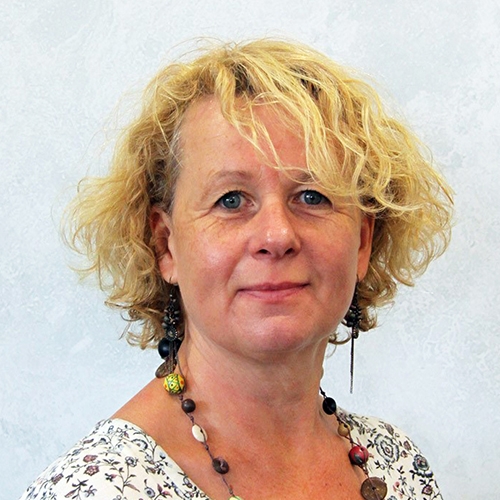
Changing Outcomes for Breastfeeding Families Lecture Pack
This Academy of Breastfeeding Medicine Lecture Pack 2019 consists of presentations which were originally presented at the 24th Annual International Meeting of the Academy of Breastfeeding Medicine in the UK. The 24th Annual International Meeting features world-class speakers providing cutting-edge research and clinical information on current issues in breastfeeding medicine, spanning both maternal and child health. Physicians, registered nurses, lactation consultants, and other professionals will have the opportunity to continue their professional education in a highly respected, stimulating environment, while earning continuing education credits.


Dr. Maria Enrica Bettinelli is Lecturer of Pediatrics, University of Milan, Italy School of Medicine. As IBCLC since 2003, her research focuses on how overcoming barriers to implement breastfeeding support in the community and to promote mother and babies well-being in the perinatal period and the first years of life, adopting nurturing care approach. She has authored peer-reviewed publications on baby friendly community, breastfeeding rates in Lombardy, and the maternal and child health effects of lactation.
Her current research includes the clinical management of breastfeeding difficulties and how emotional experiences impact on breastfeeding decision. As Director of Milan Breastfeeding Network in Milan, Dr. Bettinelli leads an interdisciplinary team of clinicians, nurses and midwives that is developing new approaches to management of breastfeeding difficulties and to sharing breastfeeding education. Dr. Bettinelli is a member of the Italian Society of Pediatrics and Italian Society of Neonatology, chairs the Task Group of Education and Conference 2020 of ELACTA Board 2018-2020 and is a member of the ELACTA Board 2018-2020, and since 2012 is a member of the Academy of Breastfeeding Medicine.
Dr. Bettinelli attended University of Milan School of Medicine where she graduated with her M.D. in 1986. She completed her Residency in Pediatrics in 1989 and in Neonatology in 1991 at University of Milan and went on to complete her medical experience at Mangiagalli Hospital in Milan. Dr. Bettinelli obtained her MSc in Perinatal Mental Health in 2019.
She lives in Milan, Italy with her husband and her daughter.
Objective 1: Understand relationship and mechanisms linking breastfeeding, attachment and perinatal mental health;
Objective 2: Learn how breastfeeding can reduce risk of perinatal mood disorders;
Objective 3: Manage and support breastfeeding in case of mothers affected by perinatal mood disorders.
Breastfeeding, attachment, and perinatal mental disorders share the same neurobiological circuits and neurosciences have shown there are connections acting both in a protective and negative sense. Relational experiences in the early years of life put the basis for future physical and mental health. Avoiding early toxic stress is essential in preventing mental problems later. Maternal depression, and in general perinatal mental disorders of parental figures, especially of the mother, have a well-documented negative effect on infants and children, altering the mechanism of responsive interaction. Depressed mothers do not engage with their children and fail to respond to their signals. Children find this situation stressful, and there may be permanent effects arising from being raised by chronically depressed parents.
According to recent studies, breastfeeding helps reduce early toxic stress, as well as allowing optimal nutrition. The responsive interaction mode is the basis of the relationship established with breastfeeding. So breastfeeding has a significant impact on the mental health of children and adolescents. The way mothers respond to their children's needs is the key to understanding these long-term effects. When mothers respond consistently to the signals of their children, they lay the foundations for the resilience of their children. By understanding that the success of breastfeeding is linked to perinatal maternal mental health, we can create awareness when counseling the breastfeeding mother.


Peter has a background in Medical Statistics and a particular interest in infant and childhood epidemiology. Born in Manchester, England, he studied Mathematics (BSc Hons) and Medical Statistics (MSc) before moving to Bristol where he completed his doctorate (Epidemiology of Sudden Infant Death Syndrome) in 1998. From his work on several major observational studies he is a recognised expert with over 100 publications in the SIDS field and was made an honorary fellow and advisor to UNICEF (UK) on infant care practices in 2009. In 2014 the Queen’s Annual Prize for Further and Higher Education was awarded to the University of Bristol based on Peter and his colleague Peter Fleming’s contributions in this field. He is the elected Chair of the International Society for the study and prevention of Perinatal and Infant Death (ISPID) and chair of the epidemiological working group. He is also a senior consultant methodologist for both the University of Bristol Trials Unit and the NIHR Research Design Service. He lives with his partner Helen and two sons, Jacob & Sam, aged 19 and 21 years.
Objective 1: Delegates will be able to discuss the epidemiological evidence around the divergence in public health approaches to hazardous sleeping environments;
Objective 2: Delegates will be able to describe the impact public health approaches may have on international SIDS rates;
Objective 3: Delegates will be able to discuss the epidemiological evidence surrounding the promotion of dummy use.
Although the evidence suggests that promoting breastfeeding will reduce the risk of SIDS, some of the other risk-reduction advice given to parents seems counter-intuitive in terms of enabling breastfeeding. This talk will take a closer look at the epidemiological evidence (or lack of it) surrounding the promotion of dummy use, putting babies to sleep in cardboard boxes, the divergence in public health approaches to hazardous sleeping environments and the impact this may be having on international SIDS rates.


Fiona Dykes is Professor of Maternal and Infant Health and leads Maternal and Infant Nutrition and Nurture Group (MAINN), at University of Central Lancashire, Preston, UK. Fiona has a particular upon the global, socio-cultural and political influences upon infant and young child feeding practices; her methodological expertise is in ethnography and other qualitative research methods. Fiona is the Conference Convenor and Chair of the Scientific Review Committee for the MAINN Conference, a three day, international, peer reviewed event established in 2007 and held bi-annually in the UK and, more recently, on alternate years overseas (Sydney, Australia, Sweden and Florida). She is a member of the editorial board for Maternal and Child Nutrition. Fiona is author of Breastfeeding in Hospital: Mothers, Midwives and the Production Line (Routledge) and co-author, with Dr Tanya Cassidy of Banking on Milk: An ethnography of donor human milk relations (Routledge). She is also joint editor of several books including Infant and Young Child Feeding: Challenges to implementing a Global Strategy (Wiley-Blackwell) and Ethnographic Research in Maternal and Child Health (Routledge).
Objective 1: Delegates will be able to explain importance of relationships being central to breastfeeding at an organizational, family, and staff-parent level;
Objective 2: Delegates will be able to investigate the ways in which we can shift the focus from breastfeeding as a mechanistic and productive process, concerned primarily with nutrition to a relational one;
Objective 3: Delegates will be able to describe the influence of culture and paradigmatic stance upon our way(s) of conceptualising infant and young child feeding and breastfeeding.
In this presentation, Fiona Dykes describes a program of research that has significantly contributed to a paradigm shift in the Unicef UK Baby Friendly Initiative (BFI). In 2013, Unicef UK BFI published a revised set of evidence-based standards for all maternity and children's services placing a particular emphasis on mother-infant relationship building rather than the previous specific emphasis on breastfeeding (Unicef UK 2013).


Christine is both a General Practitioner and senior lecturer in the Dept. of Paediatrics at The University of Auckland. She has taken a career long interest in Sudden Unexpected Death in Infancy and is now a doctoral candidate with Prof. Ed Mitchell. She also has a Primary care liaison role at her local district health board and is a clinical editor for primary care web-based Auckland Regional HealthPathways. Her current programme of research involves implementing and evaluating a web-based SUDI risk assessment tool with wrap around care planning for babies at higher risk, in the Counties Manukau Health District Health Board area in Auckland, New Zealand.
Objective 1: Delegates will be able to describe current understanding of Sudden Unexpected Death in Infancy;
Objective 2: Delegates will be able to discuss how individualised SUDI risk assessment can inform conversations in clinical care around SUDI protection care including breastfeeding and related behaviours such as bed sharing;
Objective 3: Delegates will be able to apply a systematic SUDI risk assessment for targeting SUDI protection care in higher risk populations.
Sudden Unexpected Death in Infancy (SUDI) is the sudden death of a baby who was thought to be healthy in the 24 hours prior to death. SUDI remains as a leading cause of post neonatal death in many countries and indigenous and marginalised population groups are the most affected. Experts agree that most SUDI deaths could be prevented, however successful SUDI prevention programmes require system wide, consistent SUDI prevention advice and programmes tailored for higher risk groups.
The Safe Sleep Calculator is a SUDI risk assessment web-based tool that considers 15 SUDI risk factors and provides individualised recommendations on risk reduction. It enables clinicians to provide objective individualised advice for families on infant care behaviours to reduce SUDI risk. The experiences of implementing the Safe Sleep Calculator in a primary care setting and, in a district health board area in New Zealand, will be described.


Tony Waterston is a retired consultant paediatrician who worked mainly in the community in Newcastle upon Tyne, UK. He spent 6 years working in Zambia and Zimbabwe and directed the Royal College of Paediatrics and Child Health Diploma in Palestinian Child Health teaching programme in the occupied Palestinian territories. He was an Editor of the Journal of Tropical Pediatrics and is on the Executive Committee of the International Society for Social Pediatrics. His academic interests are child poverty, advocacy for child health and children's rights. He is currently the lead moderator of CHIFA (HIFA's sister forum on child health and rights).
Objective 1: List the reasons why sponsorship of paediatric associations by BMS manufacturers is harmful to breastfeeding;
Objective 2: Describe process which led to the ending of sponsorship by the RCPCH;
Objective 3: Apply the methods of advocacy to end global sponsorship of paediatric associations by BMS manufacturers.
I shall summarise the problems created by sponsorship of paediatric associations by the manufacturers of Breastmilk Substitutes, using findings from the literature. I shall then present the experience of the Royal College of Paediatrics and Child Health (RCPCH) in the UK, over the last 20 years since efforts were first made by the membership to end the sponsorship by several formula manufacturers including Nestle and Danone. Following a number of motions passed at the AGM over successive years, members voted in 2017 to end sponsorship. Following this the leadership carried out a consultation of the whole membership which led to the policy of sponsorship being re-affirmed. In 2019, following a change in leadership and the publication of two critical papers in prominent medical journals, the policy was changed to end all sponsorship by BMS manufacturers. The essential ingredients of this successful advocacy were lobbying by members over a long period of years; the publication of critical data in medical journals; and the election of officers sympathetic to a change of policy.
Accreditation
CERPs - Continuing Education Recognition Points
GOLD Conferences has been designated as a Long Term Provider of CERPs by the IBLCE--Approval #CLT114-07
This program is approved for 3.75 CERPs (2.25 L- CERPs, 1.5 R-CERPs)
Additional Details
Viewing Time: 4 Weeks
Tags / Categories
(IBCLC) Clinical Skills, (IBCLC) Psychology, Sociology, and Anthropology, Baby-Friendly Hospital Initiative, Ethics for Lactation Professionals, Perinatal Mood and Anxiety Disorders, Sleep
How much time do I have to view the presentations?
- The viewing time will be specified for each product. When you purchase multiple items in your cart, the viewing time becomes CUMULATIVE. Ex. Lecture 1= 2 weeks and Lecture Pack 2 = 4 Weeks, you will have a total of 6 weeks viewing time for ALL the presentations made in that purchase.
- Time for viewing the talks begins once you purchase the product. For Live Webinars & Symposiums, the viewing period begins from when the live event takes place. Presentations can be accessed 24/7 and can be viewed as many times as you like during the viewing period.
What are bundled lectures?
- Presentations may be available individually or via a bundled package. Bundled lectures are a set of lectures that have been put together based on a specific category or topic. Some lectures will be available in both individual and lecture form, whereas others will be available only via a bundled lecture pack.
Will there be Handouts?
- YES! Each lecture comes with a PDF handout provided by the Speaker.
Some lectures include a Q&A, what does that mean?
- During our online conferences, presentations that occur live are also followed by a short 15 minute Question & Answer Session. The Speaker addresses questions that were posted by Delegates during the presentation. We include the recording of these Q&A Sessions as a bonus for you.
How can I receive a Certificate?
- If this presentation offers a certificate, once you are done viewing the lecture or the lectures within a bundle, submit your attendance record in order to be able to download your certificate. You'll be able to see which credits are offered for the lecture by hovering over the "Credits Available" link within the "Speakers & Topics" tab.
Professionals that selected this package also viewed

|
|

|









